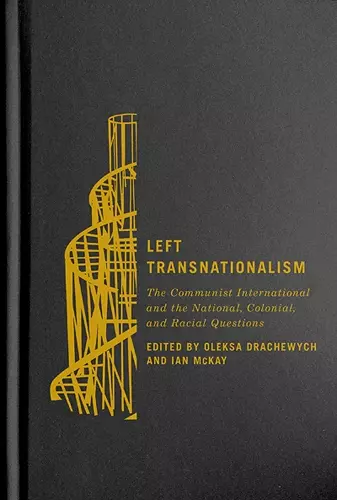Left Transnationalism
The Communist International and the National, Colonial, and Racial Questions
Ian McKay editor Oleksa Drachewych editor
Format:Hardback
Publisher:McGill-Queen's University Press
Published:16th Jan '20
Currently unavailable, our supplier has not provided us a restock date
This hardback is available in another edition too:
- Paperback£35.00(9780773558731)

An exploration of the ways interwar communism sought to combat imperialism, support self-determination of nations, and promote racial equality.
In 1919, Bolshevik Russia and its followers formed the Communist International, also known as the Comintern, to oversee the global communist movement. From the very beginning, the Comintern committed itself to ending world imperialism, supporting colonial liberation, and promoting racial equality. Coinciding with the centenary of the Comintern's founding, Left Transnationalism highlights the different approaches interwar communists took in responding to these issues. Bringing together leading and emerging scholars on the Communist International, individual communist parties, and national and colonial questions, this collection moves beyond the hyperpoliticized scholarship of the Cold War era and re-energizes the field. Contributors focus on transnational diasporic and cultural networks, comparative studies of key debates on race and anti-colonialism, the internationalizing impulse of the movement, and the evolution of communist platforms through transnational exchange. Essays further emphasize the involvement of communist and socialist parties across Canada, Australia, India, China, Japan, Southeast Asia, Latin America, South Africa, and Europe. Highlighting the active discussions on nationality, race, and imperialism that took place in Comintern circles, Left Transnationalism demonstrates that this organization - as well as communism in general - was, especially in the years before 1935, far more heterogeneous, creative, and unpredictable than the rubber stamp of the Soviet Union described in conventional historiography. Contributors include Michel Beaulieu (Lakehead University), Marc Becker (Truman State University), Anna Belogurova (Freie Universitat Berlin), Oleksa Drachewych (University of Guelph), Daria Dyakonova (Université de Montréal), Alastair Kocho-Williams (Clarkson University), Andrée Lévesque (McGill University), Lars T. Lih (Independent Scholar), Ian McKay (McMaster University), Sandra Pujals (University of Puerto Rico), John Riddell (Ontario Institute of Studies in Education), Evan Smith (Flinders University), S.A. Smith (All Souls College, Oxford), Xiaofei Tu (Appalachian State University), and Kankan Xie (Peking University).
“Mao’s appraisal of the Comintern as a force behind Communist movements worldwide and as an organizational body that applied obdurately its “Moscow Line” approach instead of adapting to suit specific movements, is where Left Transnationalism breaks new ground. At its heart … Left Transnationalism constitutes a “post-post-Cold War project” that throws overdue light on horizontal links that operated “without the direct involvement of Moscow.”” Histoire sociale/Social History
“By offering a fresh perspective on urgent, but critically neglected, topics within a transnational framework, Left Transnationalism reinvigorates the study of international communism and provides a benchmark for future Comintern scholarship.” University of Toronto Quarterly
ISBN: 9780773558724
Dimensions: unknown
Weight: 737g
424 pages